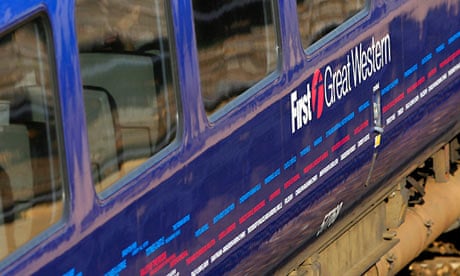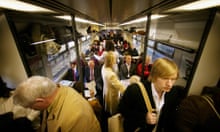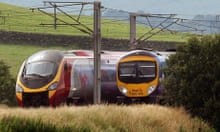One of Britain's most prestigious and lucrative rail franchises, the west coast mainline, was awarded to FirstGroup in a move that spells the end for Sir Richard Branson's Virgin Trains and led to transport analysts, the opposition and unions questioning whether the bid would lead to another fiasco.
Branson, whose company has run the route since 1997, branded the decision "insanity", claiming that the government was taking a risk on "almost certain bankruptcy", while the RMT union said it would be "an action replay of GNER and National Express" – both of which were unable to see out their terms on the east coast line after making huge bids. Labour said the government needed to show it had not been "blinded by the numbers".
However, FirstGroup, the UK's largest rail operator, said its winning bid of £5.5bn for the rights to run the line from December until 2026, rising to £6.1bn if it sees out a 20-month extension, was a "deliverable proposition" that would exploit unused capacity on the InterCity west coast services from London to destinations including Glasgow, Manchester and Liverpool.
FirstGroup will also be offering a total of £265m in guarantees, including an unprecedentedly high £190m forfeit if it walks away early.
The west coast mainline is the first of several long, lucrative franchises to be awarded over the next two years. The government has pledged to lower the taxpayer subsidy to the railway and has demanded large savings after the McNulty review identified potential costs to cut in the industry.
FirstGroup was by far the highest bidder, and will have to find £390m in premiums each year compared with the £160m currently paid by Virgin, which tabled an enhanced offer of around £4.8bn (£5.4bn for the full term).
Branson said Virgin would not be bidding for a franchise again – although he later told Channel 4 News he would reconsider if "we get a call from David Cameron saying sorry".
FirstGroup said it would add around 12,000 seats, with 11 extra trains, and new direct services from the capital to stations including Blackpool, Shrewsbury and Bolton, although the DfT said this was not a franchise commitment. It will also reduce first-class seating, while reconfiguring the Pendolino trains to add more seats.
Tim O'Toole, US-born chief executive of FirstGroup, rejected claims that there was excessive risk in his company's bid and said there was huge scope for growth on the line. He also categorically denied there would be job losses as unions fear, although he said many would be redeployed. "Our winning bid is a deliverable proposition that is compelling for all who want to see a greater use of our rail networks," he added.
Longer trains and additional seating will mean 35% more seats on the line in five years, O'Toole said: "We will be making significant improvements including reduced journey times and introducing new direct services. We will improve marketing and deliver a smart ticketing system, refreshed and improved train interiors, station upgrades and even better catering."
He would not confirm the name of the new service that will succeed Virgin although FirstGroup has registered the name Horizon at Companies House.
O'Toole said he believed Virgin had failed to exploit the possibilities to attract customers on to the trains in quieter periods, and promised a 15% reduction in standard anytime fares over the next two years, a pledge that would see the price of a £148 single from London to Manchester drop by around £22.
Overall, fares are set to rise above inflation every year for the foreseeable future.
The FirstGroup bid depends on passenger growth of 5.8% each year, a figure O'Toole said matched government predictions for trains to be at the limits of capacity by 2026, when the proposed high speed rail network should start operating. Responding to Branson's criticisms, he said: "I think he lost the bid."
Virgin Trains, which is 49% owned by the transport group Stagecoach, is believed to be considering challenging the decision in the courts.
Unions and campaigners have warned the size of the bid means the operator will have to cut services. RMT union leader, Bob Crow, said: "It is clear that this franchise is being let on pure McNulty terms with a gold-plated, extended contract linked to massive cuts to jobs and passenger services and huge increases in fares as the winning FirstGroup looks to extract every penny that they can in profit."
City analysts queried the numbers. Mike van Dulken at Accendo Markets said [FirstGroup] had "promised lots of investment, but growth and profitability assumptions could be too much."
The transport academic Stephen Glaister, of the RAC Foundation, said: "The big test here is that this award is going to a company that can deliver on what it promised."
He said the biggest risk was that forecast growth in traffic would not materialise and the company could end up walking away from the franchise. FirstGroup declined to take up the last three years of its contract to run Great Western services, when it would have had to pay around £800m in premiums to the government.
Maria Eagle said that awarding FirstGroup the west coast franchise meant that "private train companies know that there are no penalties for gaming the rail system at the expense of taxpayers". She added: "They now know they can choose not to complete in full the maximum possible length of a franchise to avoid hundreds of millions of pounds in payments to the government and be rewarded with an even more lucrative contract."
However, the rail minister, Theresa Villiers, said: "This new franchise will deliver big improvements for passengers, with more seats and plans for more services."
The DfT could not specify how targets would be enforced. Others queried how much the service element played in the award, given that FirstGroup's other train services have scored below Virgin in customer satisfaction ratings.










Comments (…)
Sign in or create your Guardian account to join the discussion